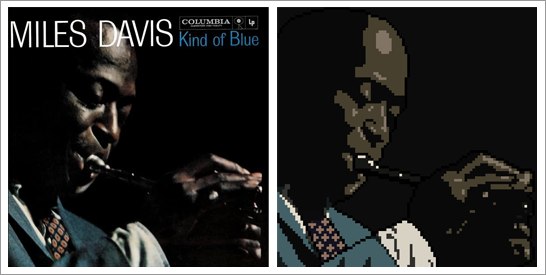Andy Baio posted a smart, insightful and painful blog post about a fair use failure last week . Andy basically coordinated the making of Kind of Bloop, a 50th anniversary remake of Miles Davis’ “Kind of Blue” done in 8-bit sound.
For the cover of the album he had someone remix the original cover art to turn it into an 8 bit version.
The original cover art was based on a photo Jay Maisel. For remixing Jay Maisel’s photo, Andy was hit with a copyright suit asking for $150,00 per infringement plus legal fees. To put this in context the project only cost 2k to license all the music involved and to create the tribute. Andy also explicitly stated that the whole project was being done for fun and that he was not keeping the proceeds:
To create this album, I hope to raise $2,000 to pay royalties, pay the artists, and print CDs. Legally releasing cover songs requires paying mechanical licenses to the song publishers through the Harry Fox Agency, totaling about $420 for every 250 downloads and a $75 processing fee. I’ll be using the remainder to print a very limited run of CDs for Kickstarter backers, and split the rest evenly among the five musicians for their painstaking work. (This is a labor of love for me, so I won’t be keeping a dime.)
This was basically a noncommercial venture made at cost.
When you look at the legal threat asking for 75x the cost of production it is clear that the legal threats were not about a fair license agreement, but about controlling art. When faced with these legal threats Andy decided settled out of court for $32,500 and Andy is “unable to use the artwork again” as part of the settlement. Read that again, this is not a 32k license agreement. This is a 32k penalty, that comes with a censorship agreement. The settlement is 4x the total that was brought in by the kick starter to fund the whole project and is extremely troubling for three reasons:
- The remixed cover art is likely a transformative fair use and should not have to be licensed - Andy does a good job of making the transformative point in is post, and pointing out that fair use.
- Licensing an image for remix is very difficult as there is no compulsory license mechanism. Fred Beneneson makes this point well in -There’s No Such Thing as a Compulsory License for a Photo
- Copyright is being used here as censorship not at a way to encourage new works to be created. This is where I am joining the discussion.
The most disturbing part of Andy’s post was the reaction to the 8 bit art work cover by the photographer:
And it’s worth noting that trying to license the image would have been moot. When asked how much he would’ve charged for a license, Maisel told his lawyer that he would never have granted a license for the pixel art. “He is a purist when it comes to his photography,” his lawyer wrote. “With this in mind, I am certain you can understand that he felt violated to find his image of Miles Davis, one of his most well-known and highly-regarded images, had been pixellated, without his permission, and used in a number of forms including on several websites accessible around the world.” (emphasis added)
Remix art work that is disturbing to the original artist is just the type of art work that needs to be protected by fair use! Fair use is the codification of the free speech in the copyright act. Disturbing transformative art work that targets the original work has a stronger fair use claim if it is criticizing the original work, ie parody. Now this is not a typical case of parody as the remixer here likes the original work, but it bares several similar aspects with regard to how the artist reacts and the art5ist unwillingness to license at any price.
When one can not license to create art work we must have an exception or copyright becomes a blunt instrument of censorship.
This is the third another example of a remix case that has gone horribly wrong for remix artists.
- AP v. Shepard Fairey for basing his famous Obama Hope poster on a news photo. (Fairey faked evidence harmed the fair use claim)
- JK Rowling v. RDR – Lexicon ruled not fair use, never appealed
One Thing to learn from all of these cases though is that the law fails to kill remix culture. Even with Fairey’s bad faith the court pushed for a license over censorship. In the case of RDR books the unauthorized lexicon is on the book self just in an a shorter version.
In the case of Jay Maisel photo the threats only served to more widely distributed the work he was trying to suppress. The remix has even been transformed into a vector graphic, enlarged and placed across his home.
Appropriation artist targets Jay Maisel
Students for Free Culture, for bring this issue up
Jennifer Sanchez, 3L @ Seattle University Law, for legal research for this post.
Closing thought:
“A parodist need not demonstrate that the copyright owner would prohibit the use in order to qualify the copy as fair use under Campell.” Leibovitz v. Paramount Pictures, 137 F. 3d 109, 115, C.A.2 (N.Y.), 1998.
We need the same rights for remixer, even if they love the art they are remixing!
Edit: title changed to Jay Maisel: Copyright Misused as Censorship



